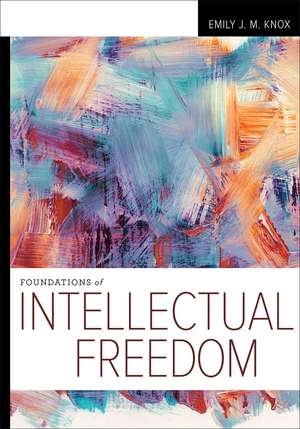Foundations of Intellectual Freedom
Autor Emily J. M. Knoxen Limba Engleză Paperback – 28 oct 2022
- the historical and legal roots of intellectual freedom, with an in-depth examination of John Stuart Mill’s “On Liberty” and Article 19 of the U.N Declaration of Human Rights, and its central concepts and principles;
- the intersection of intellectual freedom, freedom of expression, and social justice;
- professional values, codes of ethics, ALA’s Library Bill of Rights, and Freedom to Read/View Statements;
- pro- and anti- censorship arguments and their use in impeding and facilitating access to information;
- book banning and internet filtering;
- privacy and its relationship to information services;
- U.S. case law and precedents;
- the basics of U.S. copyright law, including fair use, and how it differs from international copyright law; and
- emerging global issues and their impact on future intellectual freedom.
Preț: 422.17 lei
Nou
Puncte Express: 633
Preț estimativ în valută:
80.78€ • 84.57$ • 66.84£
80.78€ • 84.57$ • 66.84£
Carte tipărită la comandă
Livrare economică 07-21 aprilie
Preluare comenzi: 021 569.72.76
Specificații
ISBN-13: 9780838937839
ISBN-10: 0838937837
Pagini: 144
Dimensiuni: 178 x 254 x 3 mm
Greutate: 0.26 kg
Editura: American Library Association
Colecția ALA Neal-Schuman
ISBN-10: 0838937837
Pagini: 144
Dimensiuni: 178 x 254 x 3 mm
Greutate: 0.26 kg
Editura: American Library Association
Colecția ALA Neal-Schuman
Recenzii
"An excellent addition to ALA Neal-Schuman’s 'Foundations' series ... Some parts of this book may appeal to students and academics interested in brushing up on current definitions of key concepts related to intellectual freedom: freedom of expression, access to information, censorship, and privacy. Other parts of this book contextualize intellectual freedom within the library profession and will be best appreciated by librarians grappling with professional ethics in a changing socio-political landscape ... Knox offers a primer on intellectual freedom for library students and librarians alike, succinctly revealing the complexity of this timely topic."
— Library Journal
"The book’s central chapters explore the intersections between intellectual freedom and the often competing values of freedom of expression, information access, privacy, and copyright, and the two concluding chapters focus on their implications for information professionals. While the inclusion of discussion questions and annotated lists of recommended reading will make this a natural fit for MLIS courses, Knox’s concise approach ensures its usefulness for librarians and library workers at all levels.”
— Booklist
"Each of the chapters constitutes a good capsule conversation on its own, and chapters can be read out of sequence according to the interests of the reader. Where necessary, Knox reintroduces vocabulary or concepts that will be helpful in each chapter ... The text and the references give readers a strong grounding in theories of intellectual freedom to make decisions for themselves. This text will be a valuable foundation resource for information professionals in libraries of all types.”
— College & Research Libraries
— Library Journal
"The book’s central chapters explore the intersections between intellectual freedom and the often competing values of freedom of expression, information access, privacy, and copyright, and the two concluding chapters focus on their implications for information professionals. While the inclusion of discussion questions and annotated lists of recommended reading will make this a natural fit for MLIS courses, Knox’s concise approach ensures its usefulness for librarians and library workers at all levels.”
— Booklist
"Each of the chapters constitutes a good capsule conversation on its own, and chapters can be read out of sequence according to the interests of the reader. Where necessary, Knox reintroduces vocabulary or concepts that will be helpful in each chapter ... The text and the references give readers a strong grounding in theories of intellectual freedom to make decisions for themselves. This text will be a valuable foundation resource for information professionals in libraries of all types.”
— College & Research Libraries
Notă biografică
Emily J. M. Knox is an associate professor in the School of Information Sciences at the University of Illinois at Urbana-Champaign. Her book Book Banning in 21st Century America was published by Rowman and Littlefield and is the first monograph in the Beta Phi Mu Scholars Series. She is also the editor of Trigger Warnings: History, Theory Context (Rowman and Littlefield) and is coeditor of Foundations of Information Ethics (ALA Neal-Schuman). Her articles have been published in Library Quarterly, Library and Information Science Research, and the Journal of Intellectual Freedom and Privacy. Dr. Knox has served on the boards of the Association for Information Science and Technology, Freedom to Read Foundation, and the National Coalition Against Censorship. Her research interests include information access, intellectual freedom and censorship, information ethics, information policy, and the intersection of print culture and reading practices. She is also a member of the Mapping Information Access research team. She received her PhD from the Rutgers University School of Communication and Information. Her master’s degree in library and information science is from the iSchool at Illinois. She also holds a BA in religious studies from Smith College and an AM in the same field from the University of Chicago Divinity School.
Cuprins
Preface
Acknowledgments
Chapter 1 Intellectual Freedom: A Core and Contested Value
Chapter 2 A History of Intellectual Freedom
Chapter 3 Freedom of Expression
Chapter 4 Information Access and Censorship
Chapter 5 Privacy and Intellectual Freedom
Chapter 6 Copyright and Intellectual Freedom
Chapter 7 Intellectual Freedom and the Information Professions
Chapter 8 Current and Future Issues in Intellectual Freedom
Index
Acknowledgments
Chapter 1 Intellectual Freedom: A Core and Contested Value
Chapter 2 A History of Intellectual Freedom
Chapter 3 Freedom of Expression
Chapter 4 Information Access and Censorship
Chapter 5 Privacy and Intellectual Freedom
Chapter 6 Copyright and Intellectual Freedom
Chapter 7 Intellectual Freedom and the Information Professions
Chapter 8 Current and Future Issues in Intellectual Freedom
Index
Descriere
Featuring questions for further study and inquiry in each major chapter, this book introduces the key concept of intellectual freedom to those about to enter the profession, providing a concise overview of principles, ongoing and current debates, and best practices.
Enshrined in the mission statement of ALA, intellectual freedom is one of the core values of the information professions. The importance of ensuring information access to all, and the historical, social, and legal foundations of this commitment, are powerfully explored in this essential primer. Designed to function as both an introductory text for LIS students as well as a complementary resource for current professionals, this book provides a cohesive, holistic perspective on intellectual freedom. Extending beyond censorship to encompass such timely and urgent topics as hate speech and social justice, from this book readers will gain an understanding of
- the historical and legal roots of intellectual freedom, with an in-depth examination of John Stuart Mill’s “On Liberty” and Article 19 of the U.N Declaration of Human Rights, and its central concepts and principles;
- the intersection of intellectual freedom, freedom of expression, and social justice;
- professional values, codes of ethics, ALA’s Library Bill of Rights, and Freedom to Read/View Statements;
- pro- and anti- censorship arguments and their use in impeding and facilitating access to information;
- book banning and internet filtering;
- privacy and its relationship to information services;
- U.S. case law and precedents;
- the basics of U.S. copyright law, including fair use, and how it differs from international copyright law; and
- emerging global issues and their impact on future intellectual freedom.




